Pre-employment screening is like a superhero for recruiters. It helps identify the best candidates and ensures they have the right skills for the job.
This blog post exists to guide recruiters through comparing Adaface and Crystal. You'll understand the differences and similarities to help you make an informed decision.
Explore this post with:
Table of contents
How does Adaface work?
Adaface offers a dynamic platform for pre-employment assessments, helping companies identify top-tier talent through engaging, customized tests. Covering a broad range of subjects from programming to business skills, Adaface aims to improve hiring accuracy and efficiency.
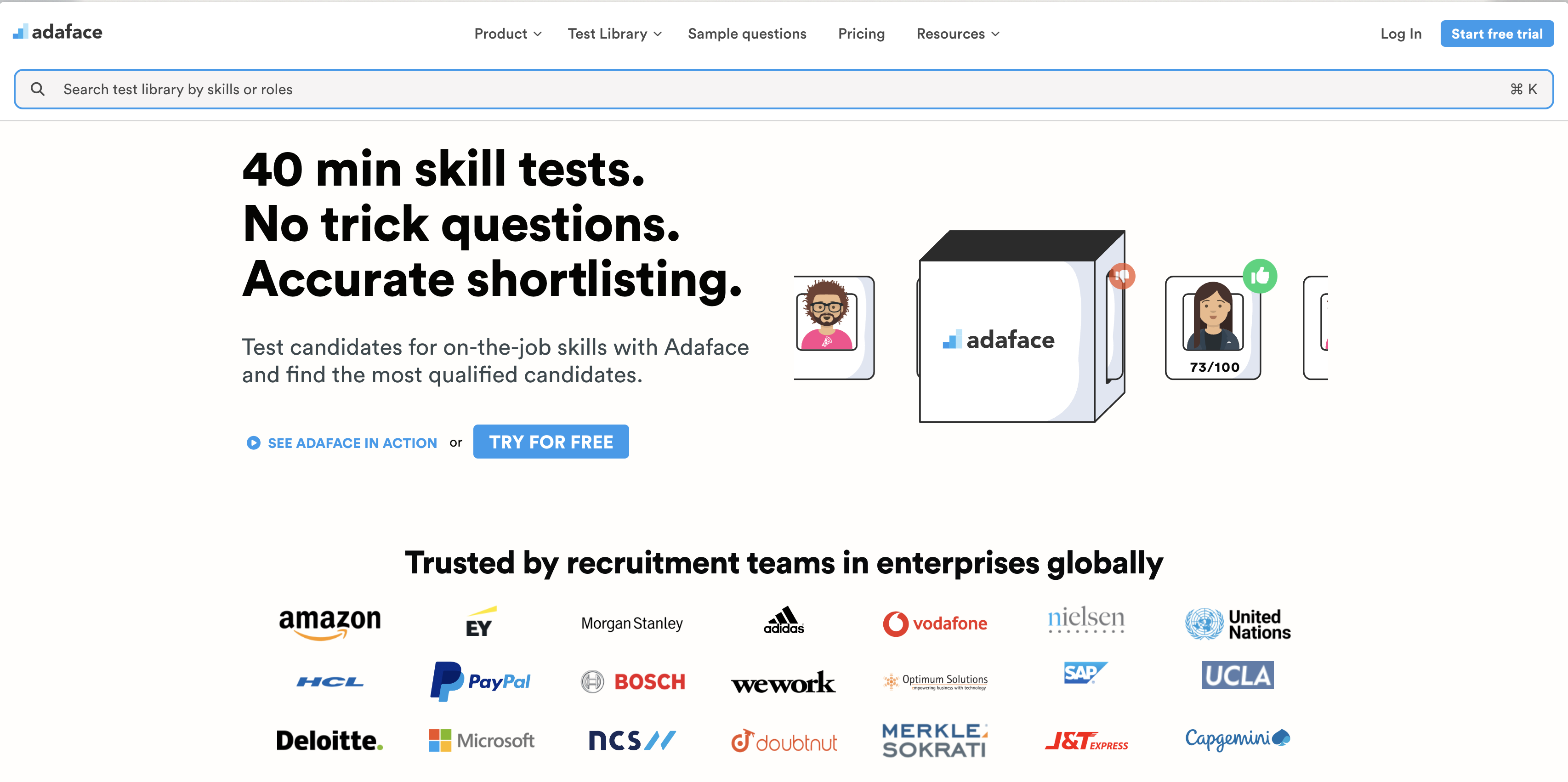
Recruiters prefer Adaface for its ability to create tailored assessments based on specific job descriptions. This personalized approach ensures that candidates are tested on relevant skills, providing hiring managers with a clear picture of each candidate's suitability for the role.
Another favorite among recruiters is Adaface's conversational interface, which enhances the candidate experience. This feature makes the assessments less daunting and more interactive, leading to higher completion rates and more genuine evaluations.
Adaface also excels with its extensive proctoring features like remote proctoring, ensuring accurate assessments while maintaining test integrity. Additionally, its robust integration capabilities make it a seamless addition to any HR tech stack.
How does Crystal work?
Crystal is an assessment platform designed to help recruiters evaluate a candidate's personality fits and work styles. It uses a unique approach involving personality assessments that claim to identify how individuals will perform in various roles based on their behavioral traits.
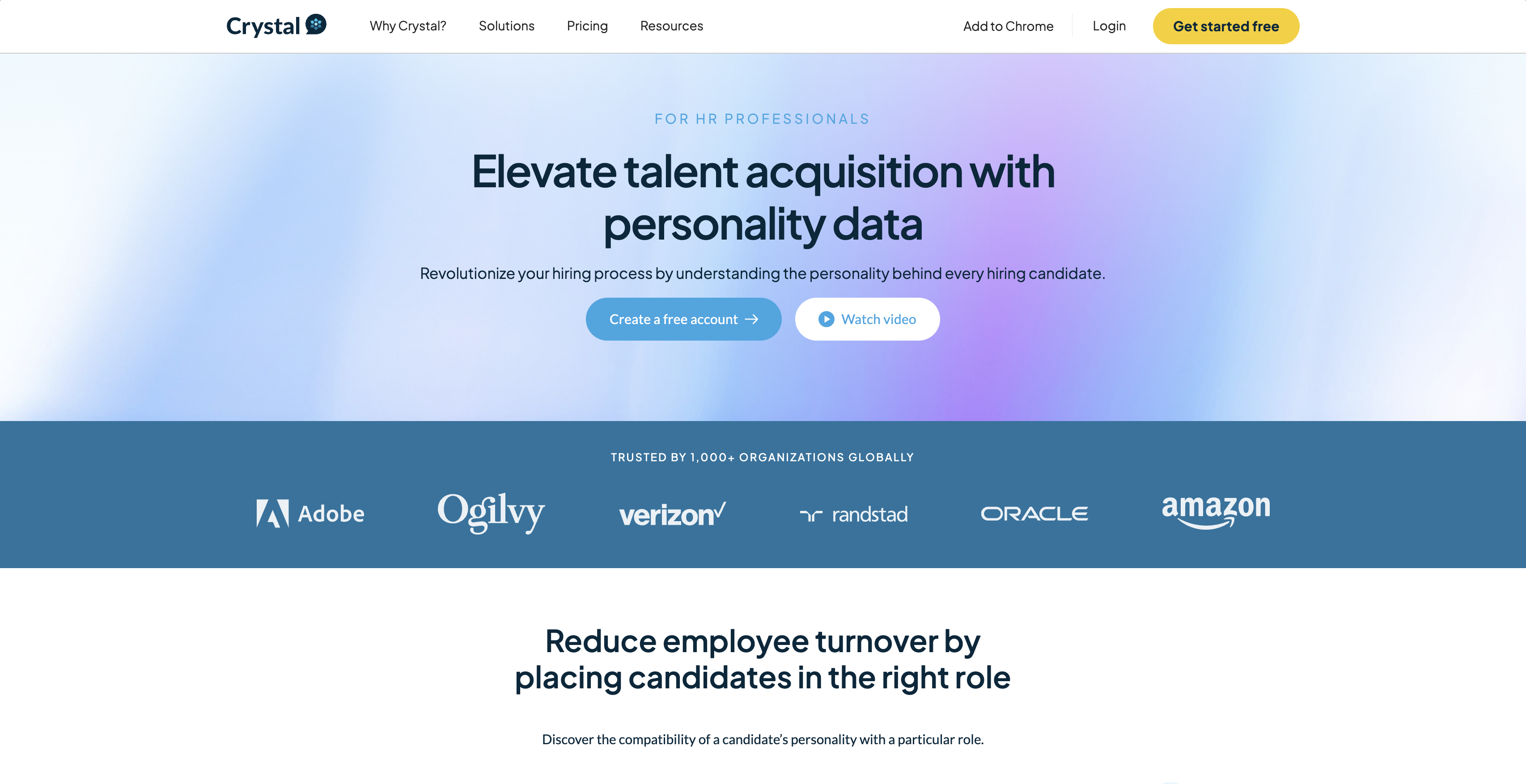
The platform offers insights through personality tests that align with job requirements. For instance, a recruiter could utilize Crystal to screen candidates for a sales role by assessing their traits that indicate resilience and sociability.
One notable feature of Crystal is its focus on providing detailed personality analytics. It breaks down a candidate's potential strengths and challenges, facilitating tailored hiring decisions.
However, Crystal misses out on a broader range of assessment types, such as assessments for coding skills or cognitive abilities, which are crucial for a comprehensive hiring process.
Adaface vs Crystal: Test libraries
Adaface's test library is a treasure trove for recruiters, offering a vast range of assessments from programming and aptitude tests to language and finance tests. With over 500+ skills covered, Adaface ensures that all critical aspects of hiring are catered to effectively.
Crystal, on the other hand, has a more limited test library. While it includes some personality tests and ready-to-use assessments, it falls short in areas like programming, business skills, and custom question support.
Adaface's test library
Here's why recruiters love Adaface's test library:
- 500+ skills coverage
- Aptitude tests including logical, numerical, verbal, and abstract reasoning
- Programming tests with coding questions and scenario-based MCQs
- Business and finance assessments
- Multiple language tests at various proficiency levels
Recruiters choose Adaface because it allows them to tailor assessments to match specific job descriptions. The ability to add custom questions and utilize scenario-based MCQs ensures that candidates are evaluated holistically for their roles.
To see Adaface's test library in action, visit the Pre-Employment Assessment Test Library and explore categories like Programming Tests, Artificial Intelligence Tests, and Role-Specific Tests.
Crystal's test library
Crystal's test library primarily focuses on personality assessments, providing insights into candidates' traits and behaviors. However, it falls short in offering a variety of job-specific technical assessments, making it less versatile for diverse hiring needs.
The main selling point of Crystal's library is its ability to help recruiters understand candidates at a personal level, which can be beneficial for team dynamics. This can aid in selecting candidates who not only fit the job but also the company's culture.
However, Crystal lacks a wide range of tests for technical skills, cognitive abilities, and specialized job roles, which can limit its usefulness for organizations looking to evaluate candidates comprehensively across different skill sets.
Comparison of test libraries
Adaface vs Crystal: Business, Marketing and Ops Roles
Recruiters often turn to skill assessments to ensure candidates are equipped for the specific roles they're being considered for. These tests help in narrowing down the applicant pool by focusing on the skills necessary for the job.
Both Adaface and Crystal offer tools to assess on-the-job skills, though they approach it differently. While Crystal provides a basic personality test, Adaface offers a more extensive array of tests that cover both technical and soft skills, giving it a distinct advantage.
Business, Marketing and Ops Roles with Adaface
Adaface boasts a rich library of 500+ assessments designed for role-specific skills screening. These include:
Recruiters choose Adaface because it allows them to tailor tests to specific roles, ensuring that candidates are evaluated against the exact skills needed. Additionally, the platform's scenario-based questions provide a more nuanced insight into a candidate's abilities.
Beyond just assessments, Adaface enables recruiters to integrate custom questions into their tests, adapting to unique hiring needs. This flexibility ensures that each assessment reflects the specific requirements of the job, making the hiring process more aligned with real-world tasks.
Hiring Business, Marketing and Ops Roles with Crystal
Crystal provides some support for assessing non-developer roles with a focus on personality tests. However, its offerings lack a diverse range of role-specific skills assessments that can cater to various job functions beyond just personality evaluation.
The test library from Crystal includes ready-to-use assessments that simplify the hiring process, particularly for roles that benefit from personality insights. Yet, without a comprehensive selection of job-specific tests, hiring managers might find themselves with limited options for accurately gauging a candidate's relevant skills.
While Crystal does offer personality assessments, it falls short in providing scenario-based questions and customizable tests tailored to specific job descriptions. This can limit the ability to thoroughly evaluate candidates on the precise skills required for various non-developer roles.
Adaface vs Crystal: Developer hiring
When hiring developers, you need to assess a candidate’s full range of technical skills to see if they align with your team and workload.
Look for a platform that offers a range of these tests, including coding and algorithmic-thinking challenges. You’ll also want to evaluate candidates’ ability to work with different frameworks and coding languages.
Hiring developers with Adaface
Adaface offers a comprehensive suite of functionalities for hiring developers. These include programming language coding questions, web and mobile framework assessments, and SQL coding questions.
Crystal, on the other hand, lacks these in-depth functionalities. It does not provide programming language coding questions, framework-specific assessments, or SQL coding challenges.
Adaface's functionalities for hiring developers include:
- Coding questions for various programming languages
- Web and mobile framework questions
- Data Structures and Algorithm questions
- Custom coding questions and code playback
Recruiters use Adaface to hire developers because it provides both in-depth coding questions and MCQs. This balanced approach ensures that candidates are evaluated thoroughly and fairly across a wide array of skills.
Additionally, Adaface supports custom coding questions and code playback. These features allow recruiters to create tailored assessments and review candidates’ coding process in detail.
Hiring developers with Crystal
Crystal's programming assessment support is rather limited when it comes to hiring developers. It doesn't offer coding questions for programming languages, web frameworks, mobile frameworks, or data structures and algorithms. This means that if you're looking to deeply assess a candidate's coding ability across these areas, you might find Crystal falling short.
While Crystal has some features for hiring, it lacks a robust test library specifically tailored for developers. There are no SQL coding questions or Excel workbook questions available, which can be a drawback for companies looking to assess specific technical skills in these domains. This limits the versatility of the platform in providing varied technical assessments.
One notable gap in Crystal's offerings is the absence of features like code playback and automated scoring. These features are quite beneficial for hiring managers who need a clear and comprehensive understanding of a candidate's coding process and abilities. Additionally, the lack of custom coding questions might restrict companies from tailoring assessments to their specific needs.
Comparison of developer hiring features
Adaface vs Crystal: Candidate experience and company branding
A great candidate experience can make or break your hiring process. It affects how applicants perceive your company and influences their decision to complete assessments or accept job offers.
Key factors in creating a positive experience include mobile-friendly tests, quick loading times, and easy navigation. Offering candidate support and keeping assessments to a reasonable length also boost completion rates.
Candidate experience and company branding with Adaface
Adaface offers a unique conversational interface that makes assessments feel more engaging and less like traditional tests. This approach helps create a friendly, approachable testing environment that candidates appreciate.
The platform provides mobile support for most assessments, allowing candidates to complete tests on their preferred devices. With a typical assessment length of 40 minutes, Adaface strikes a balance between thoroughness and candidate convenience.
Adaface also enhances company branding by allowing customization of invitation and rejection email templates. This feature, combined with the ability to add company logos and brand colors, creates a cohesive and professional image throughout the hiring process.
Candidate experience and company branding with Crystal
Crystal offers a mobile-friendly platform with email support and help documentation available to candidates. Their assessments are typically short, around 15 minutes, making it easy for candidates to complete them quickly. However, they lack a conversational interface, which can make the tests feel more formal and less engaging.
When it comes to company branding, Crystal allows the addition of company logos and brand colors to the assessment interface. This helps maintain a consistent brand image throughout the hiring process. Unfortunately, there are no options for customizable invitation or rejection templates, which could limit how personalized the candidate communication feels.
A strong candidate experience should not only be user-friendly but also engaging to keep candidates interested and motivated. Having a conversational interface can amplify this experience. Additionally, qualifying questions at the start of an assessment can save time for both parties, ensuring only the relevant candidates proceed further.
Adaface vs Crystal: Anti-cheating features
In the realm of online assessments, ensuring fairness and integrity is paramount. Effective proctoring features are essential to prevent cheating and validate the authenticity of candidates' performance.
Anti-cheating features of Adaface
Adaface is equipped with a suite of powerful anti-cheating features that make it a standout option for recruiters. These features include:
- Email authentication
- Browser tab and window tracking
- Webcam video monitoring
- Location logging
- IP tracking
- Device fingerprinting
- Copy-paste protection
- Full-screen usage enforcement
- Chat GPT protection
- Multiple question sets and plagiarism detection.
One key highlight of Adaface's proctoring capabilities is its webcam video monitoring. This feature ensures that the candidate is present throughout the test and isn’t receiving outside help. Combined with IP tracking and device fingerprinting, recruiters can verify the authenticity of test takers.
Moreover, Adaface’s full-screen usage enforcement and copy-paste protection prevent candidates from navigating away from the test window or sharing test content. This ensures questions remain secure and answers are genuinely the candidate's own work.
To learn more about Adaface’s robust remote proctoring features, visit Ensure accurate assessments with remote proctoring features. Additionally, for a deeper dive into online proctoring, check out Everything you should know about online proctoring.
Anti-cheating features of Crystal
Crystal provides user authentication features, ensuring candidates verify their identity before beginning a test. However, information on its other proctoring capabilities like web and webcam monitoring, location logging, and IP tracking is not readily available.
User authentication in Crystal can be particularly useful in preventing unauthorized individuals from taking the test on behalf of the candidate. This feature helps maintain the integrity of the assessment process by confirming the test-taker's identity.
Crystal lacks several advanced anti-cheating measures, such as device fingerprinting, Chat GPT protection, and plagiarism detection. These omissions could leave room for potential cheating through device sharing or utilizing AI tools.
Comparison of anti-cheating features
Adaface vs Crystal: Pricing and free trial
When it comes to pre-employment assessment tools, pricing can be a deal-breaker. Recruiters should look for transparent pricing models that provide flexibility and value for money.
Adaface pricing
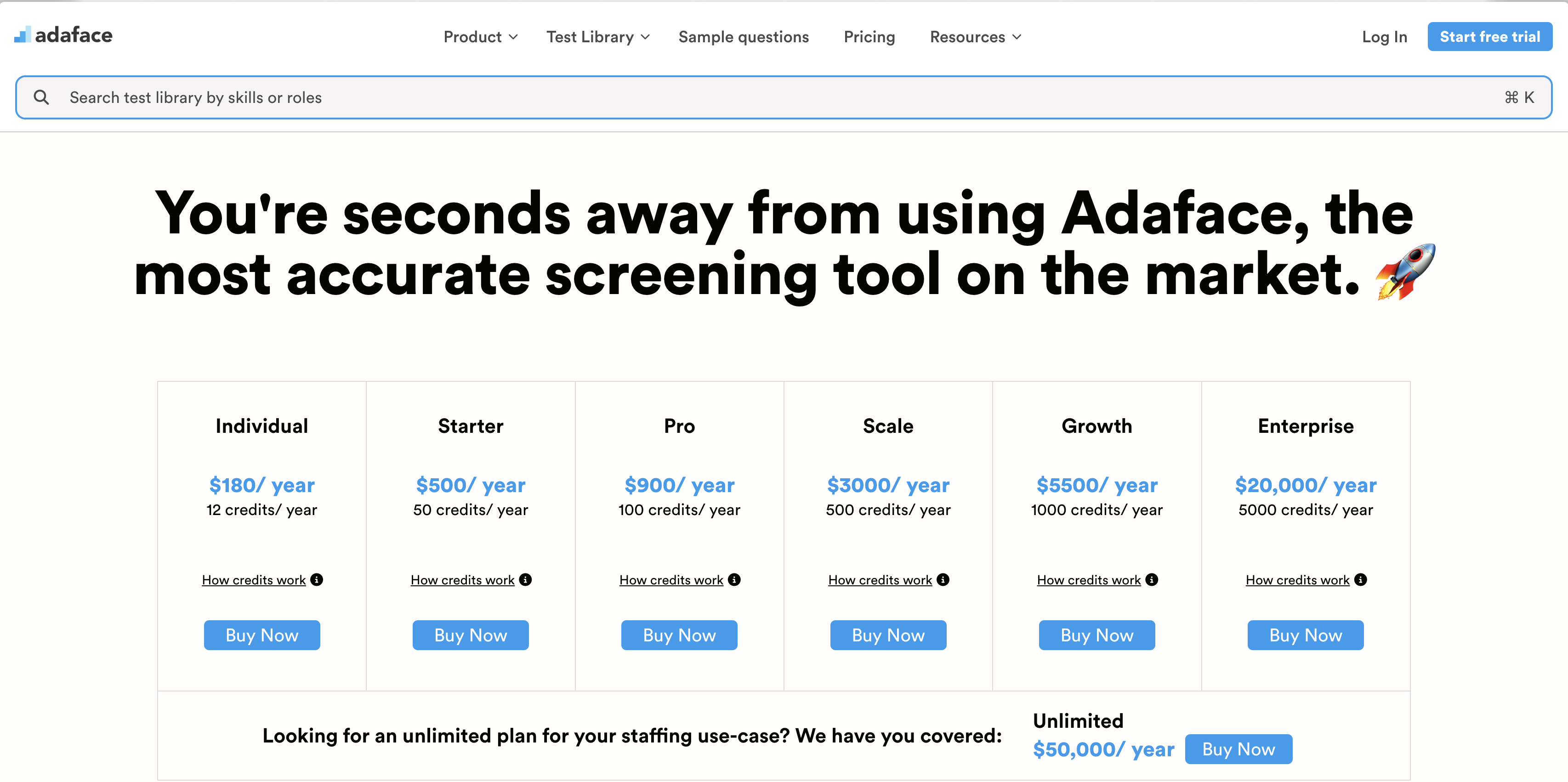
Adaface offers a range of pricing plans designed to cater to various hiring needs. Whether you're a startup or a large enterprise, we've got you covered with options that offer great value.
Here are the available plans:
- Starter: $500 for 50 credits
- Scale: $3,000 for 500 credits
- Growth: $5,500 for 1,000 credits
- Enterprise: $20,000 for 4,000 credits
- Unlimited: $50,000 per year for unlimited assessments
Our pricing is straightforward and designed to scale with your needs. You can start with the Starter plan and easily upgrade as your hiring requirements grow. We also offer a free trial so you can explore our features before making a commitment.
Crystal pricing
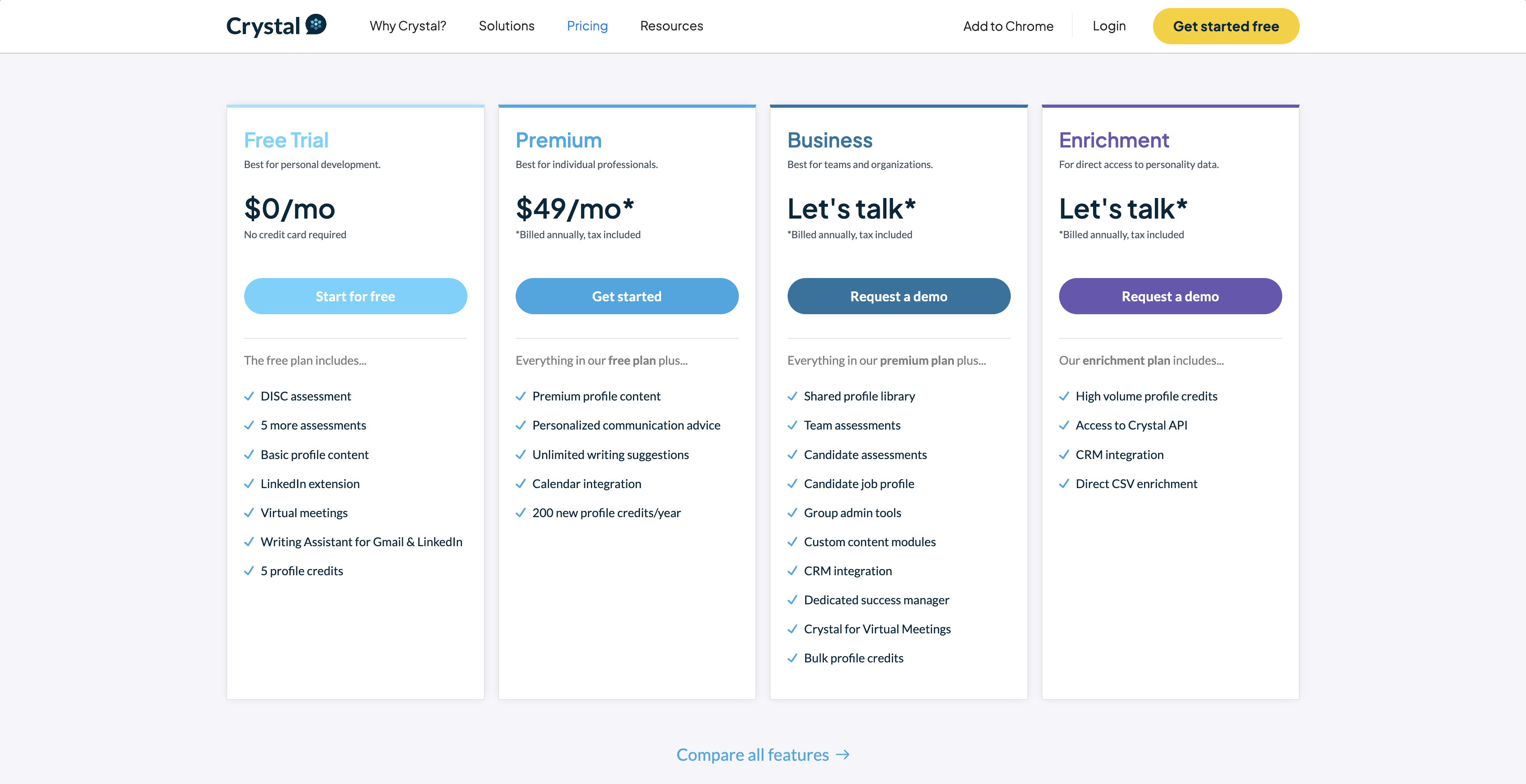
Crystal offers a variety of pricing plans designed to cater to different hiring needs. Their plans include:
- Individual Plan: Starting at $180.
- Starter Plan: Priced at $49 per month.
- Scale Plans: Pricing available upon request.
- Growth Plans: Pricing details to be discussed with the team.
- Enterprise Plans: Pricing also provided upon inquiry. Crystal does offer a free trial, which helps recruiters get a feel for the platform before committing.
While Crystal provides several plans, the lack of clear and accessible pricing information for their Scale and Growth plans might leave recruiters feeling a bit cloudy. Additionally, the absence of a straightforward way to explore all features or sign up without a call could make it a tad less inviting for those eager to dive right in and start assessing candidates.
Comparison of pricing
Adaface vs Crystal: Scorecards, reporting and analytics
For recruiters, high-quality scorecards, reporting, and analytics features are non-negotiable. These tools help sift through large candidate pools, offering insights and actionable data that streamline hiring decisions. The best platforms provide detailed, easily shareable reports and transparent analytics.
Adaface scorecards, reporting and analytics
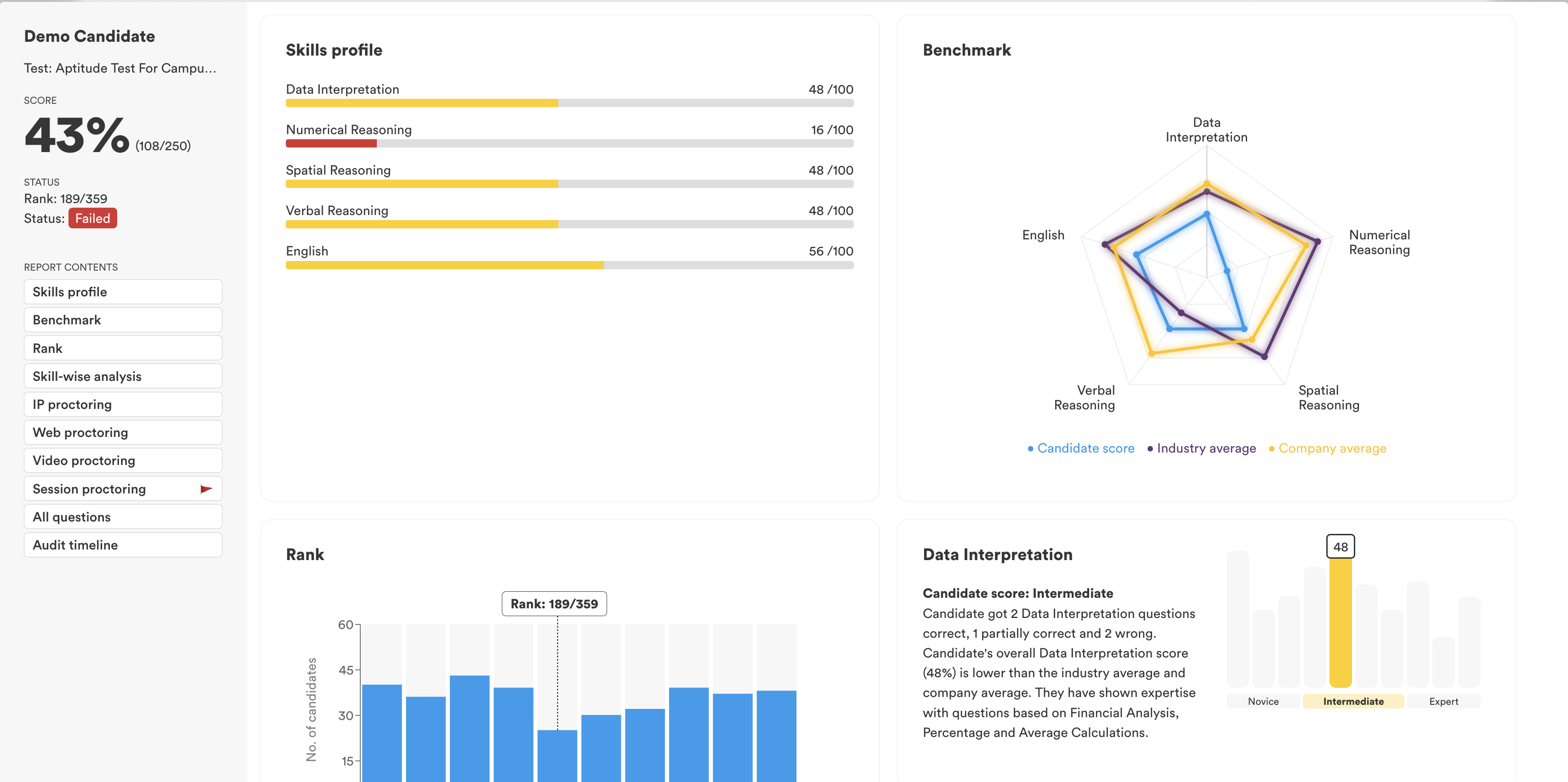
Adaface offers automated scorecard generation and real-time alerts, making the hiring process more seamless. Recruiters can access detailed audit timelines for proctoring, ensuring transparency and trust in the results. The platform also allows for skill-wise analysis, breaking down candidate performance by categories and topics.
With Adaface, you can download reports in PDF, Excel, and CSV formats, making it easy to share insights with your team or clients. This flexibility lets you use the data for internal evaluations without the hassle of data conversion. Public reports are also supported via unique links, handy for sharing results with external stakeholders.
For a diverse range of assessments, Adaface provides benchmarking features to compare candidates against the talent pool. This helps you identify top performers and make informed hiring decisions. To see Adaface's reporting in action, check out this visual-reasoning-test scorecard and this accounting-test scorecard.
Crystal scorecards, reporting and analytics
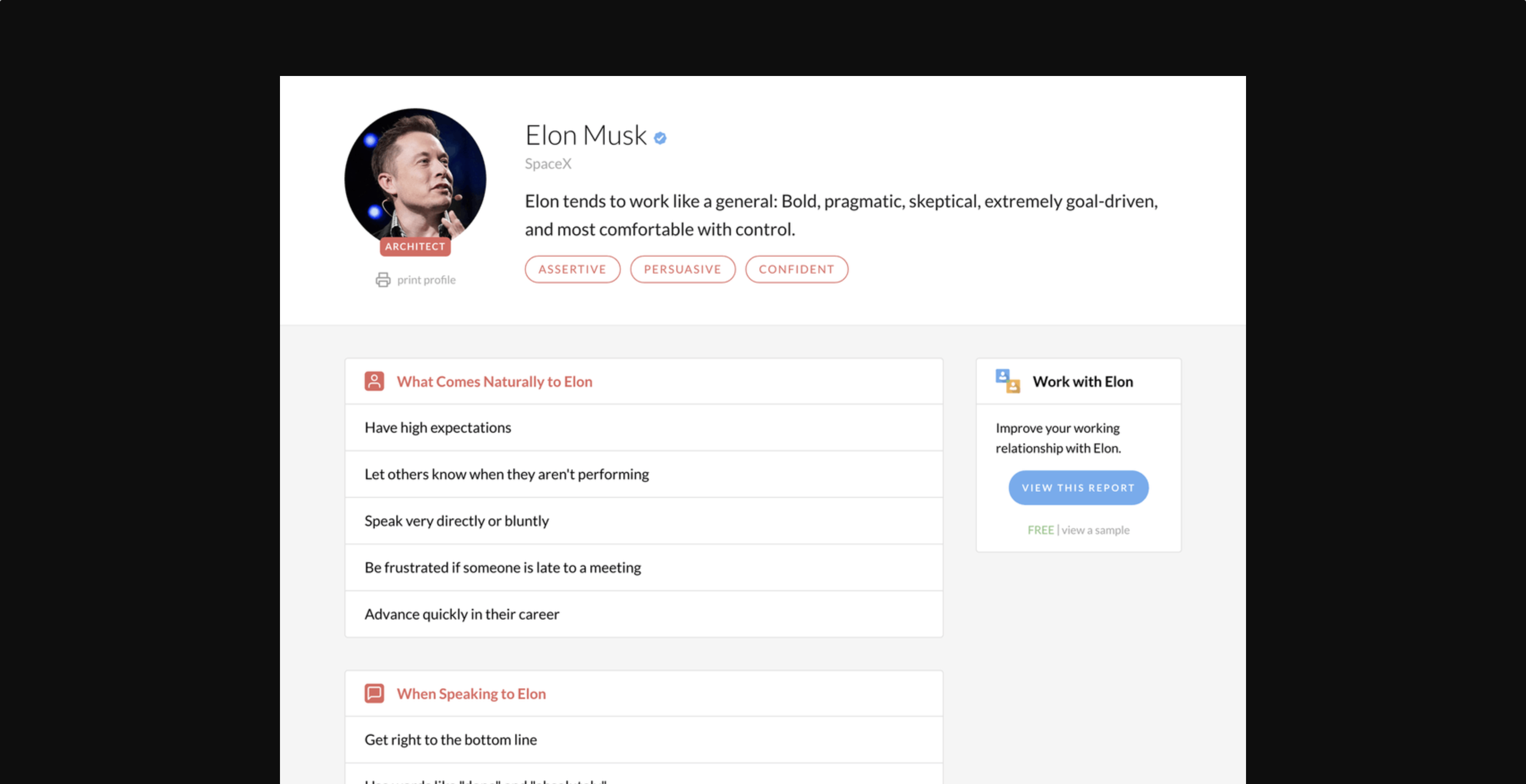
Crystal offers automated scorecard generation and PDF reports, making it easy for recruiters to share candidate assessments internally. However, it lacks options for exporting reports in Excel or CSV formats.
You can view detailed reports that include candidates' scores and timelines. This allows hiring managers to see how long candidates took on each section and their overall performance.
However, Crystal does not provide benchmarking against other candidates or public links for sharing reports. The tool also doesn't give recruiters a skill-wise analysis or an audit timeline for in-depth review.
Comparison of scorecards, reporting and analytics
Adaface vs Crystal: Enterprise and startup friendliness
When choosing an assessment tool, both enterprises and startups need a product that offers seamless integration, compliance with regulations, and flexibility to adjust to their unique needs. These features ensure that companies of all sizes can streamline their hiring processes without disruption.
Adaface's enterprise and startup friendliness
Adaface shines with its seamless ATS integrations, allowing enterprises to manage assessments without switching platforms. This feature is not available with Crystal, giving Adaface a clear edge for larger organizations needing smooth workflows.
For enterprises concerned with legal compliance, Adaface is GDPR compliant and offers support for custom data locations, ensuring data stays within desired jurisdictions. This is particularly reassuring for companies with strict data residency requirements.
Startups will appreciate Adaface's multiple invite options, enabling recruiters to reach candidates via email or public links. This flexibility is critical for lean teams needing to cast a wider net efficiently. For more insights on boosting startup recruitment, check out our Recruiting for Startups guide.
Crystal's enterprise and startup friendliness
Crystal offers GDPR compliance and multiple invite options for candidates. It supports enterprises and startups with these basic features, though it lacks some advanced integrations.
Companies can use Crystal to assess candidates' personality traits and work styles. This can help in matching applicants to specific roles or team dynamics.
However, Crystal doesn't provide ATS integrations or a custom API. It also lacks features like custom data location support and multiple question sets, which some larger organizations might need.
Comparison of enterprise and startup friendliness
Adaface vs Crystal: Assessment quality control
When it comes to assessments, quality control is like a superhero cape—it ensures that the tests you use are reliable and effective. Recruiters should care about this because high-quality assessments lead to better hiring decisions and a smoother recruitment process.
Adaface's quality control features
Adaface employs a meticulous quality control process that includes rigorous checks before any question goes live. This means only well-crafted questions make it to your assessments, ensuring a true reflection of candidates' skills.
Candidate feedback is also a key player in our quality control. By gathering insights from test-takers, we continuously improve and update our question bank, making sure our assessments remain relevant and accurate.
With features like social listening, Adaface actively monitors for any question leaks, helping to keep your assessments secure and valid. Recruiters can trust that they are using fresh, effective questions that accurately gauge candidate abilities.
For a deeper dive into our approach to quality, check out how we design questions at Adaface, where we blend science and user feedback to create the best testing experience.
Crystal's quality control features
Crystal has quality checks in place before questions go live on their platform. This ensures that the questions added are relevant and help assess a candidate's skills accurately.
The platform uses psychometric test theory to measure behavior and personality traits. Every candidate takes the same assessment, which means customers don't have options to adjust or customize the test.
It's unclear how often Crystal reviews its assessment or updates questions. There's no information available about incorporating user feedback or using algorithms to improve question quality over time.
Comparison of quality control
Adaface vs Crystal: Final verdict
Both Adaface and Crystal provide pre-employment assessments to evaluate candidates. They offer features like personality tests and mobile-friendly interfaces.
Despite these similarities, Adaface stands out with more comprehensive tools like programming tests, situational judgment tests, and aptitude tests.
Crystal lacks key features such as custom questions, coding tests, and AI-specific assessments, which are crucial for a thorough evaluation.
Streamline hiring with skill tests
Adaface, on the other hand, covers all these areas and more, providing a complete solution tailored to various roles and industries.
Pre-employment assessments give recruiters a way to objectively evaluate candidates, reducing bias and focusing on their skills.
Using these assessments, recruiters can save time and ensure they are choosing the most qualified candidates for their roles.
Adaface offers a robust solution with features like coding tests, custom assessments, and excellent candidate experience. Check out Adaface to see how it can enhance your hiring process.
Adaface vs Crystal FAQs
Adaface offers a wide range of tests including programming, situational judgment, aptitude, business, language, and more.
No, Crystal does not support custom question creation for assessments.
Yes, Adaface offers language tests in 10 languages with various proficiency levels.
Adaface uses features like webcam proctoring, IP tracking, and plagiarism detection to ensure test integrity.
Yes, Crystal supports mobile-friendly assessments.
Yes, Adaface integrates with all popular ATS systems.

40 min skill tests.
No trick questions.
Accurate shortlisting.
We make it easy for you to find the best candidates in your pipeline with a 40 min skills test.
Try for freeRelated posts



